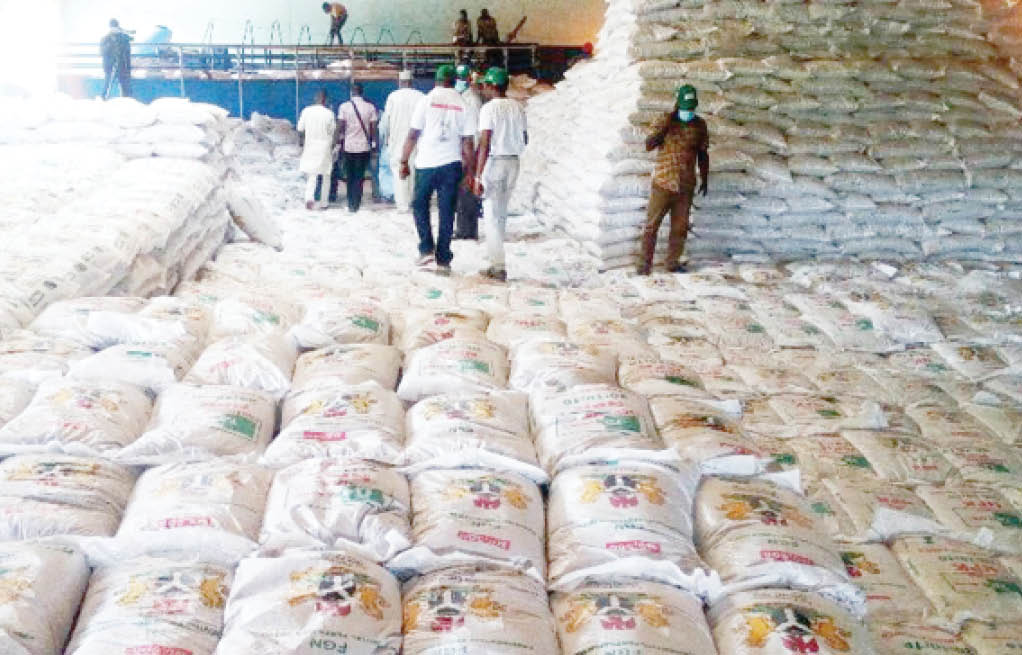By Vincent A. Yusuf, Abuja, Ibrahim Musa Giginyu, Kano & Idris Mahmud, Katsina
Early in the season, crop farmers were quite concerned about the cost of fertiliser as prices spiked between N23,000 and N31,000.
Although the Director of Fertilizer and Input Supply at the Federal Ministry of Agriculture and Rural Development, Mr Ishaku Buba, and the executive secretary of the Fertiliser Producers and Suppliers Association (FEPSAN), Mr Gideon Negedu, predicted a decline in price in a conversation with Daily Trust on Sunday two months ago, many dealers did not share their opinions.
Many agro-dealers stocked the product at N23,000 because they believed the price would eventually rise to at least N25,000 or more. The products, however, are currently selling at less than N23,000, leaving many of them in limbo.
Daily Trust on Sunday gathered that there has been a major decline in the price of Urea fertiliser in most marketplaces, in contrast to agro-dealers’ estimates on the price and availability.
- How Akpabio received a resounding reception
- Global financing: ‘Africa should be treated as equals, not beggars’
The price of Urea fertiliser has fallen to N16,000, which is the company price for a 50kg bag. Many dealers had hoarded it at N23,000 per 50kg in the hope that it would rise to N25,000 or more. Unfortunatly for the merchants, this is no longer the case.
Sources attributed the low demand for fertiliser now to the introduction of ammonia and other fertilisers, widely adopted by farmers in the North East and North West.
Our correspondent in Kano reports that the new fertiliser was introduced in a specific region because it cannot be used in making explosives, and it usually gives a good result when applied in farms. It is also said to be very cheap; hence the rush by farmers to acquire it.
According to Alhaji Kabiru Umar Fara, the president of the National Agric Inputs Dealers Association (NAIDA), which comprises inorganic and organic fertiliser communities, chemicals and those attached to seed businesses, among others, although Nigeria has been producing Urea fertiliser from crude oil/gas and even exporting through companies like Indorama, Notore, and recently, Dangote company, which began production last two years, dealers are skeptical about being fully involved in the business this year.
“It will baffle you to note that the company price of Urea is now a little above N16,000, and the price keeps going down. It is believed that it would drop to N12,000 or even less. This is because farmers are currently using the new form of fertiliser called ammonia, which is very cheap and gives a better result. It is apparent that the price has crashed, and as such, merchants do not deal in it that much,” he said.
The NAIDA national president explained that the use of the new form of Urea could give good yield in the short term, but there is a strong fear that the long term effect of the ammonia fertiliser may totally kill the fertility of the soil.
“As stakeholders we have written to the relevant authorities, intimating them of the dangers of a long usage of this ammonia fertiliser. The long term effect may totally kill the soil. Moreover, at the association level, we have started sensitising our members. I am sure that a move will be initiated to mop it out of the market,” the NAIDA president said.
When contacted, a Kano-based farmer, Malam Usman Ahmad revealed that with what they went through years ago on the unavailability and cost of fertiliser, many farmers have devised several measures to effectively utilise their farmlands for good yield. According to him, the use of liquid manure, gas (ammonia fertiliser), among others, has filled in the demand on Urea.
Our correspondent in Katsina also reports that many farmers are massively switching to other forms of fertiliser because of lower prices.
Also, farmers in Katsina State now consider Granular Ammonium Sulphate (NH4)2SO4 more than NPK fertiliser, which quality they question.
Sanusi Iliya Mairua, a maize farmer explained why farmers look to other alternatives because local fertiliser blenders have since spoiled the quality of NPK 20:10:10 variety by increasing the quantity of sand in it.
“Our interest on NPK 20:10:10 fertiliser has since faded away due to the increase of sand in its formula by the local fertiliser blenders. Some of us have lost a lot in their farming investment due to the use of the adulterated NPK,” he said.
Mairua added that the introduction of what they called G-DAP and G.A.S fertiliser has brought succour to them although they heard the government plan to withdraw them from markets.
“G-DAP and G.A.S fertiliser variety has been our last hope where we are to apply NPK variety. Their prices are more affordable compared to the costly Golden NPK 15:15:15 that is being sold at about N30,000 per 50Kg bag,” Mairua said.
It was observed that from the year 2020 local fertiliser blenders in the country started abusing the formula of NPK 20:10:10 variety by increasing the sand content in it, a development that had a negative effect on local farmers who used their little resources to invest in farming.
The secretary, Fertiliser Sellers Corporative Society, Funtua, Alhaji Dikko Abdullahi, said that because of high demand of the ammonium sulphate, its price has jacked up to N28,000 from N18,000 per 50Kg.
“To be sincere what the farmers are now using in place of NPK fertiliser, which is a raw material meant for blending factories. Fertiliser dealers are sourcing it from Lagos and we are selling it direct to farmers. The farmers prefer to use it than the adulterated NPK fertiliser,” Abdullahi said.
He added that the full meaning of the G.A.S is Granular Ammonium Sulphate, which is only a component in the NPK blending formula.
“Before 2020, farmers have accepted the first NPK 20:10:10 presidential intervention). It yielded them the desired result but as the adulteration began, their yield went down. There is a new order now that the government wants the Ammonium Sulphate out of the market, and farmers will be left with the option of buying United – NPK 20:10:5 at the rate of N22,000 or Golden NPK15:15:15 at N25,000,” he said.
With the National Fertiliser Quality Control Act 2019, which is a game-changer for the industry, farmers are supposed to have greater access, including favourable prices, while also leveraging on the law as a powerful tool against adulteration and fake fertiliser.
With the act, the federal government has taken its hands off the procurement of fertiliser to allow the system to be driven by the private sector, and the government, now an ombudsman and regulator.
But the government has failed in ensuring proper regulation in the industry.
What is ammonia fertiliser?
Nitrogen fertilisers come in two different varieties: ammonia-based and nitrate-based. Nitrate is absorbed by plants, where it is converted to ammonia. You may streamline the procedure and make it simpler for the plant by fertilising them with ammonia directly.
According to AmmPower, a major ammonia fertiliser producer, soil colloids that are negatively charged are drawn to ammonia-based fertilisers due to their positive electrical charge. For this reason, the plants cannot reach it as easily. However, this is not necessarily a terrible thing. Irrigation and heavy rain cannot flush the ammonia because it is bound to soil colloids.
Ammonia can cause the pH of the soil to increase when used as fertiliser. Farmers should avoid using soil that is overly acidic, but generally speaking, a higher pH level is advantageous.
The season and soil temperature are additional factors to take into account when deciding between fertiliser based on ammonia and nitrate. At temperatures below 10 degrees Celsius or 50 degrees Fahrenheit, ammonia does not function efficiently.
Nitrogen is very efficiently delivered to the soil by ammonia, increasing crop yields. Wheat, maize, and soybeans are three crops that require more nitrogen than others.
Nitrogen is a crucial component and a vital source of nutrition for developing plants. Of all commercial fertilisers, ammonia has the largest nitrogen content. It can either be directly incorporated into the soil as a plant nutrient or transformed into a number of typical N fertilisers.
Experts have warned that safety must always come first when handling ammonia. The proper personal protection equipment must be worn, both in storage facilities and when applying in the field. Free ammonia, which is water soluble, will severely harm the lungs and eyes when it reacts with bodily moisture.

 Join Daily Trust WhatsApp Community For Quick Access To News and Happenings Around You.
Join Daily Trust WhatsApp Community For Quick Access To News and Happenings Around You.

